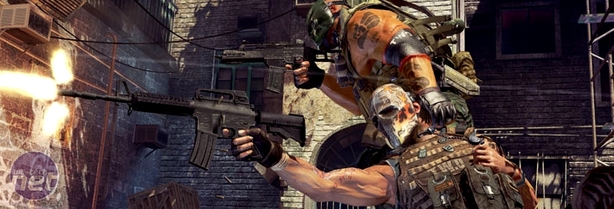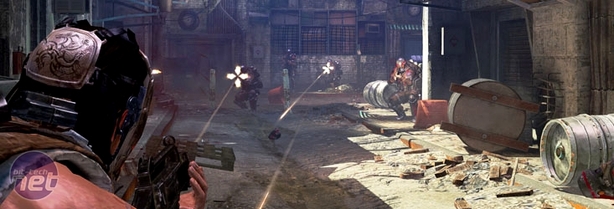
Morality and More
BT: So, what have you got in Army of Two that you feel makes it a great game?M: I think it's the idea...I mean, the exciting thing in the first one was the co-op, right? The exciting thing in the second game though is the evolution of the co-op. It's more organic and there's more dialogue between players and character interactions on screen. I think that's something that's exciting and fun because it's something new every time you play it.
Even if you play with the same person then it can be different because they'll be in a different mood and...it offers replayability in a game that doesn't hinge on the content so much as on the fact that it is co-op and therefore is replayable by design. I think that's really cool.
We were able to optimise the co-op experience a lot too. We talked about building on and learning more about the technology base and that's what we did and it allowed us to do a lot more with the game. The co-op optimisations go into everything too, like the weapon customisations where you can choose load-outs to balance out the other player.
The morality feature is tied to co-op too, where however makes a decision first will make the choice for the team and then you have to live with it. There's all the co-op manoeuvres, the co-op playbook and co-op tactics you can do. Everything in the game is co-op and it all feeds into this sense that "this is a game for me and my buddy to tackle."
BT: Can you explain a bit more about what the morality system is and how it works?
M: Yeah. There are specific moments in the game where you're asked to make a decision. You'll be asked a question that's like A or B and they'll seemingly be a negative and a positive choice to make. The negative might have an immediate reward, like guns or cash, while the positive may not. You never know if or when you'll get rewarded for them.
What's cool about it is that it adds an extra flavour to the game. So, not only do we have these moments where we're going to decide how we represent ourselves in the game, but it also gives a chance for the player to ask "What do I want? Be an asshole and take the guns?"
It's not just a gameplay thing either - it effects the story and ties into the relationship between the characters and some other gameplay stuff as well.
BT: There was a lot of parody and discussion about the types of characters you were forced to play as in the first game. Is this a direct reaction to that?
M: Well, some people reacted negatively to that, which I understand. I think we wanted to take that reaction and turn it into something that was positive, right? People did see the characters as senseless frat-boy murderers. That tone, I think, actually fit quite well for what the story was - which was cash, mercenaries, guns and running around the world fighting bad guys. I think it was pertinent and relevant to what we were doing in the first game and it was OK.
People didn't always like it though and I think what we're doing in this game is...the way that the characters interact and talk now; they've grown up a bit. It suits this story and this environment a bit more. They're in the middle of this bog disaster and they don't want to fight anyone or do anything, they've already been through a lot and they just want to get out of there and use their tools to facilitate that. In that sense, this is a more mature story anyway.
BT: With the bro-hugs and the fist-bumps and everything...were you aware of the characters you were creating and how they would seem when you made the first game?
M: Oh, yeah! That was a fully conscious choice. The team was all laughing about it and very aware of what they were making.
BT: So it was meant to be--
M: Yeah, it was meant to be a parody. The characters were supposed to be ridiculous and it was supposed to be funny to play with and silly. Completely done by choice.
I think what some people did was to project their own thoughts about the subject matter onto the game - we did deal with topics of privatization and mercenaries and the military and...war. People did that and looked at the characters and said it was disgusting, whereas in reality the characters are actually very neutral. In the end, they even go to fight against mercenaries and that stuff too.
It was funny to see that reaction and hear people say it was gross because you could fist-bump over dead bodies because, y'know - it was players doing that. That was your decision. You weren't told to do it, weren't asked to do it, you just could fist-bump and you chose to do it like that. That was interesting, but it did mean that we had to take those reactions to heart and try and define what the characters were a bit better. I think we have.

MSI MPG Velox 100R Chassis Review
October 14 2021 | 15:04











Want to comment? Please log in.